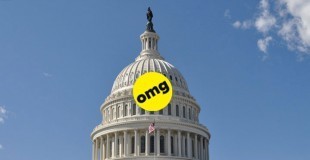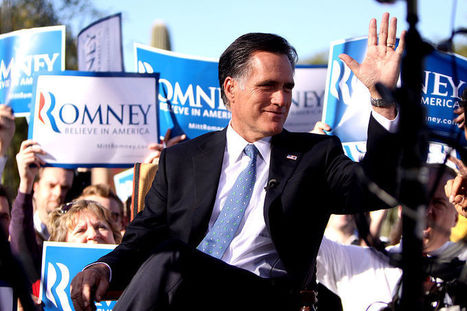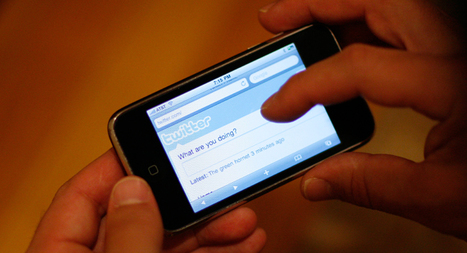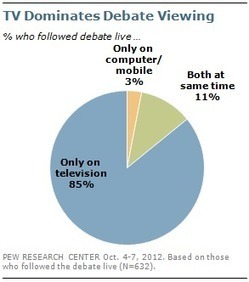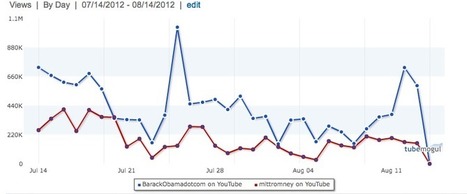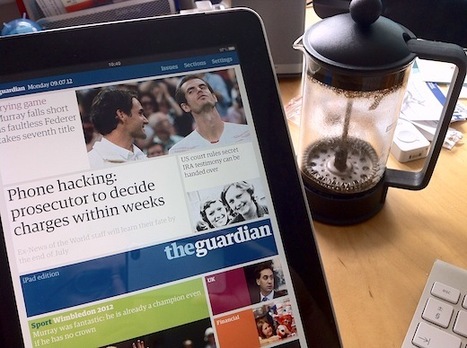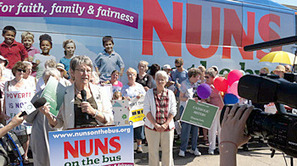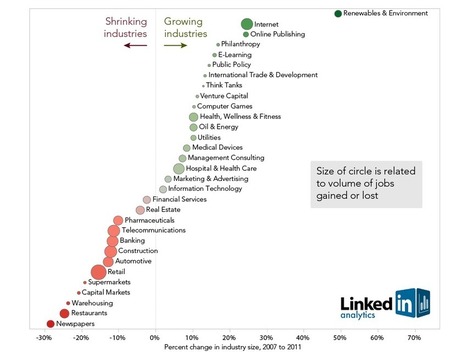 Your new post is loading...
 Your new post is loading...
Since CIA director David Petraeus resigned on Friday over an extramarital affair uncovered by the FBI, the story has shifted from John Le Carré espionage novel to Vince Flynn right-wing thriller to misanthropic Coen Brothers farce —... [Now I've seen everything - an infographic for the Petraeus affair. Ain't marketing wonderful LOL? ~ Jeff]
Because firms don't need to disclose political contributions, we don't know who's lobbying for what.are you Newsweek just released its fourth annual Green Rankings, grading the "greenness" of the 500 largest publicly-traded companies in the world. In partnership with research firms Trucost and Sustainalytics, companies are ranked based on their management, performance, and transparency in the environmental domain. One of us (Toffel) was a member of Newsweek's advisory panel. Thanks to that involvement and our research on green ratings, we understand the many challenges of rating firms' environmental performance. While leading assessments like Newsweek's are admirably rigorous and comprehensive, all major green rankings have an important blind spot: They do not account for corporate lobbying and campaign contributions around environmental policy. After all, no matter how green a company's operations and supply chains are, political efforts aimed at weakening environmental laws and regulations can have far greater environmental impact. Unfortunately, we know little about corporate political activities since much of it occurs behind closed doors. So whether companies are pushing to strengthen environmental regulations or lobbying to weaken them, none of this crucial information is incorporated into green rankings. You might think that companies that are transparent on environmental issues would also be forthcoming about their political activities. But perhaps not....
Strange PR Bedfellows: Scientology and The Nation of Islam... You may not have heard about The Church of Scientology opening a new “national affairs office” in Washington, DC’s historic Fraser Mansion last month. Small PR potatoes, right? We would normally agree–but this week The New Republic published a fascinating story that caught our eye: It would appear that The Church and The Nation of Islam—which may well be our country’s two least favorite native religious groups—have decided to join hands in the interest of faith and public relations. It’s quite bizarre.... [Can somebody please explain the upside for each? ~ Jeff ]
The seeming decline of respect for factual accuracy predates the current election cycle. Stephen Colbert unveiled his “truthiness” as a response to former President George W. Bush’s stated predilection to go with his gut when making decisions. “Truthiness is tearing apart our country,” Colbert opined. “It used to be, everyone was entitled to their own opinion, but not their own facts. But that’s not the case anymore. Facts matter not at all. Perception is everything. It’s certainty. People love the President because he’s certain of his choices as a leader, even if the facts that back him up don’t seem to exist.”
Researchers have theorized that people tend to seek out validation of their existing beliefs rather than neutrally research some objective “truth.” But it may also be that social and cultural forces are at play to produce an ongoing epidemic of “truthiness.” The Internet dumps such a torrent of information at us so quickly that we don’t have time to slow down and subject everything we read to critical scrutiny—even if we were inclined to do that. Ensconced in our media bubbles, we are used to having our beliefs validated for us and often aren’t subjected to serious critiques of what we think. Add to that the widespread cynicism that exists about cultural authorities—the notion that anyone can come up with data to support any given argument—and we’re less inclined to subject arguments we already agree with to scrutiny.
The decline of facts is by no means limited to politics. University Presidents report that plagiarism on the part of students is on the rise. So, too, is fraudulent scientific research. This past summer, a major pharmaceutical company pled guilty to having written a research article that seemed to cast its drugs in a favorable light, attaching the names of prominent academic researchers to the article....
[All about the decline in "truthiness."~ Jeff]
The cats-and-celebs site has its Washington bureau in place and is preparing to mix old-fashioned reporting with new-fashioned packaging. WASHINGTON — You should know going in that this is a story about BuzzFeed that BuzzFeed would never run. This story is longer than the last 10 articles out of the new BuzzFeed Washington, D.C. bureau combined. Some recent examples: - An airline ribbon-cutting ceremony attended by Barack Obama and Mitt Romney lookalikes
- A photo of second-button-unbuttoned “Casual Joe Biden” - Paul Ryan’s college fraternity photo
- “Barack Obama Is A Wizard”
- A dozen photos of Tim Pawlenty looking sad... [Can't wait for the sparks and GIFs to fly in the future - JD]
Earlier this month, Pfizer Consumer Healthcare announced that it had agreed to activist demands that its Centrum brand amend its marketing practices. With the prospect of a lawsuit from the Center for Science in the Public Interest (CSPI) looming, the company agreed to discontinue claims that some Centrum products promote “colon health” and “breast health.” The company also agreed to qualify statements made on the Web and in traditional advertising that certain supplements contribute to “heart health.” All of the changes, including revised product labeling, will be in effect by January 5, 2013. The agreement represents one of those rare instances in which a major corporation – they don’t get any bigger than Pfizer in the pharmaceutical industry – quickly backs down in the face of activist pressure. Some may wonder why Pfizer would make such a move. But don’t fault the company for capitulating just yet. There are least three good reasons why Pfizer’s decision made sense under the circumstances.... [A good strategic public relations lesson -JD]
Frédéric Filloux: Traditional media needs to embrace the traffic-building arsenal if it is to survive online... This is a story of pride v geekiness: traditional newspapers that move online are about to lose the war against pure players and aggregators. Armed with the conviction their intellectual superiority makes them immune to digital modernity, newspapers neglected today's internet driving forces: relying on technology to build audiences and the ability to coalesce a community over any range of subjects – even the most mundane ones. When I discuss this with seasoned newsroom people on both sides of the Atlantic, most still firmly believe the quality of their work guarantees their survival against a techno-centric approach to digital contents. I'm afraid they are wrong. Lethally so....
The moral obligations and competing values of corporations have been debated since the dawn of the Industrial Revolution: How do corporate leaders drive for profit maximization while ethically meeting the needs of communities and citizens? In the age of globalization and worldwide communications revolutions, these issues have taken a new turn. Activists in democratic countries have tried to get governments and companies to halt or limit the sale to authoritarian regimes of technologies that can be used to track, target, jail, or kill dissidents. Advocacy efforts are also being targeted at trying to convince technology companies not to allow their products to be used to spy upon, censor, block access to content, or thwart the public’s use of Internet-based tools that allow people living in authoritarian states to bring their issues to fellow citizens and allies abroad.... [A must-read for corp social responsibility pros - JD ]
History suggests that the presidential candidate with the most memorable and optimistic slogan usually wins. So does Obama or Romney have the edge? ...That pop quiz is more than an academic exercise. Presidential campaigns with the more memorable and optimistic slogans are the likeliest to win.
How much more likely? Since CNN ushered in the 24/7 media age in 1980, there have been eight presidential elections. The candidate with the more memorable and optimistic slogan won at least almost every time, and arguably every time. They didn’t win solely because of their slogans, of course, but it’s telling that candidates who never seem to settle on one are also the ones whose campaigns tend to flounder....
Overhyped gaffe coverage is a sign that editors should shift resources to other stories... Since Friday, the national political conversation has been dominated by a debate over the importance of President Obama’s statement, at a White House press conference, that “The private sector is doing fine.” Unfortunately, most of the media discussion has focused on strategy rather than policy.... These claims are representative of the way journalists routinely promote the importance of these sorts of pseudo-controversies, even though there is little convincing evidence that gaffes affect presidential election outcomes. The problem is particularly acute during the summer doldrums between the end of the primary campaigns and the party conventions. As we’ve seen, a bored press corps with space to fill can easily lose perspective.... [Really interesting read with possible PR, crisis implications when you think about it - JD]
'The World Tomorrow' will air on the RT network, and be released online, this coming Tuesday, says WikiLeaks. The new TV show from WikiLeaks founder Julian Assange is set to air April 17 on the RT network and be released online the same day, according to WikiLeaks. "The World Tomorrow" (trailer embedded below) will feature Assange interviewing "an eclectic range of guests, who are stamping their mark on the future: politicians, revolutionaries, intellectuals, artists, and visionaries," the document-dump site said in an online announcement at worldtomorrow.wikileaks.org. WikiLeaks said a dozen 26-minute episodes of the program have been completed.... [Will you be tuning in? JD]
There was a brilliant update on Twitter the other day which hit the nail right on the head. “The best social media,” it read “doesn’t happen in an office.” Here are some good examples of digital communications that caught my eye over the last few months. What’s worth commenting on is that the majority of the good examples are not done directly by comms people. They’re done by people in the field telling their stories or they’re using content that first originated outside an office to tell a story....
The Sunlight Foundation compiles list of active lobbyists on Twitter. Be wary, tweeting lobbyists: You’re being monitored. The nonpartisan Sunlight Foundation is today launching a tool designed to track the personal Twitter activity — be it musings about the Kardashians or latest meeting with a congressmen — of Washington’s influence class. Initially, 235 lobbyists appear on the Sunlight Foundation’s list, which its posting on its Twitter handle, @SunFoundation. While these lobbyist Twitter accounts have always been public, the new list makes it easier for the public to monitor all the accounts at once, the Sunlight Foundation’s Gabriela Schneider said....
|
Key question: Did Petraeus resign quickly enough?
The vast majority of Americans say they followed coverage of the first presidential debate between Mitt Romney and Barack Obama, including 56% who followed the debate live. Most of these real-time viewers watched on television, but 11% of live debate watchers were “dual screeners,” following coverage on a computer or mobile device at the same time as following television coverage. Another 3% say they followed the debate live exclusively online. The post-debate survey by the Pew Research Center for the People & the Press, conducted Oct. 4-7 among 1,006 adults, finds younger Americans are especially likely to be “dual-screeners,” following the debate live on both television and a computer or mobile device. Overall, 32% of those younger than 40 say they followed the debate live online, including 22% who followed it both on television and online, and 10% who followed exclusively on a computer or mobile device.... [Demographics and trends are interesting in this study ~ Jeff]
It seems like every politician, pundit and PBS advocate alike has weighed in on the Obama campaign's spoof of Mitt Romney's savage attack on Sesame Street's Big Bird. The Team Obama TV spot has had no fewer than 60 separate... ...airings on different networks around the country. And, PBS, the Switzerland of broadcasting, has asked that the partisan power punch be taken off the airwaves. Aside from a rather innocuous SNL segment, no one has really stopped to ask Big Bird, Elmo or Oscar the Grouch their feelings about this tempest in a teapot. So Repman's crack editorial team stepped into the lurch and arranged for an exclusive interview with the trio at a local Manhattan bagel shop. (Note: Kermit the Frog was on assignment in the Middle East and Miss Piggy was competing to become a contestant on “The Biggest Loser.”... [Steve Cody rocks in this post ;-) Jeff]
Campaigns are gearing up to shape social media reactions in real time. When President Obama and Mitt Romney take the stage for their first debate in Denver tomorrow night, a far more extensive shadow debate will unfold across social media. Campaigns and supporters will aim to seize the online "conversation" in a vast game of spin unfolding well beyond the telecast and media coverage. As a sign of just how pervasive and crucial social media has become, in some states elected officials are only one degree of "friend" separation from nearly every Facebook account holder in that state, says JD Schlough, a Democratic political strategist. And by one analyst firm's count, Twitter has 140 million U.S. users, more than 30 million of whom joined in 2012 alone. "All social media is a conversation, but the amount of people having that conversation in 2012 is a lot greater than it was in 2008. That conversation is going to happen whether the campaign influences it or not—so they better get their message out there and hold the other side accountable for mistakes," Schlough says.... Overall the goal is not just to more broadly deliver a message, but to ensure that it is delivered from trusted friends—the holy grail of marketing. After all, you are more likely to see a movie when a friend recommends it, rather than if you've seen an advertisement. That's why campaigns want to use all means possible to prime social media to distribute talking points in real-time. "If we know that people believe stuff they hear from friends more than politicians, and one of them does something stupid, or smart—or if there is a contrast on an issue—it amplifies the impact of the debate to hear and to react and add your own spin," Schlough says. "Much like the convention, they will seek to use the social media to capitalize on the good moments and fact-check the hits the other side is throwing."... [Here's a great analysis of the impact of social media post-debate ~ Jeff]
The Project for Excellence in Journalism (PEJ), an arm of the Pew Research Center directed by Tom Rosenstiel, has a new report out on "How the Presidential Candidates Use the Web and Social Media." Let me save you some time, in case you just don't have the stamina for a 33-page report on the two campaigns' use of their website blogs, Facebook, Twitter and YouTube and the level of social media response that usage generated over a two week period in early June: Their use of these tools is highly controlled and generating a relatively weak response.... That is exactly right. Neither campaign is using the web and social media in a genuinely social way. The hope that two-way media would engender a two-way political conversation--which we saw start to flower in 2004 via blogs and then blossom in 2008 via social networks--is essentially dead for now....
Ever-shifting business models in a delusional emulation of startups won't save publishers who ignore the techniques that are allowing their new competitors to succeed. I feel rather bad for my colleagues in the national newspaper business this morning. As they trek into their plush central London office, sipping their lattes1, they find the world predicting their doom and destruction. Frédéric Filloux treads a familiar path, contrasting the transitional newspaper approach to selling their stories online ("content marketing", if you insist on jargon) with that of the tech-based news publisher and aggregators: The essence of what we're seeing here is a transfer of value. Original stories are getting very little traffic due to the poor marketing tactics of old-fashion publishers. But once they are swallowed by the HuffPo's clever traffic-generation machine, the same journalistic item will make tens or hundred times better traffic-wise. Who is right? Who can look to the better future in the digital world ? Is it the virtuous author carving language-smart headlines or the aggregator generating eye-gobbling phrases thanks to high tech tools? Your guess. Snappy end to a piece, sure enough. But also, a bit of a false dichotomy, n'est pas?. In theory, the traditional news publishers could learn from the attention tactics of the aggregators a great deal more easily than the aggregators could staff up a full-blown journalism operation. When it comes to the survival of top-flight reporting, it might be time to start holding your nose, and using some more aggressive attention techniques....
Slavish fidelity to campaign position papers and official statements short-changes voters... As we sipped red wine in Washington last week, Republican pollster David Winston suddenly asked me, “Why doesn’t the media write more about issues that are of central concern to the voters? Why don’t they write more about candidate differences and the implications for the country? Instead we get a litany of process pieces with issues as a sideshow.” When pollsters—yes, pollsters—start sounding like high-minded press critics, it’s a sign that horse-race hysteria has grown to absurd levels. With the election still four months away, we are hooked up to ephemeral data bursts with a shelf life of four hours. As Winston, who has no connection to the Mitt Romney campaign, went on to say, “This coverage makes it difficult for voters to decide whom they want to give the responsibility of governing to.” But, as I struggled to explain to Winston, writing about issues in a presidential race is far more complex than merely listing Romney’s and Barack Obama’s policy proposals side-by-side, while projecting their costs based on green-eyeshade forecasts from a non-partisan think tanks. Covering issues in this formulaic fashion is not only yawn-inducing; all too often it is completely wrong....
Beth Kanter asks: How do you balance the spontaneity of social media with being strategic? ...One area of challenge: balancing strategic communications with spontaneity of social media. The spontaneous part is all the organic stuff, including relationship building, maintaining light touches and connections with your network until there is a moment of opportunity, being nimble and adaptable, and well, being social. However, these grantees also have to integrate the use of social media into a strategic communications effort that will help further their work towards policy change to support children’s health care coverage. The early results like learning or engagement - the spontaneous stuff as Allison Fine likes to call it — are not always valued. That’s because boards or senior management (or funders) don’t always understand these are part of a strategy that leads to the strategic results. Sometimes these early results are presented out of context and easily dismissed. Therefore it is very useful to show a logical path of results or describe in a logic model.... [Beth Kanter shares some great tactics from savvy nonprofits - JD]
[When it comes to PR, this group of nuns is flying - JD] ...The nuns’ bus tour is part of Network, the national Catholic social justice lobby. The nunsonthebus.com site provides updates as the sisters visit local Congressional offices (Ryan, Steve King, House Speaker John Boehner, Steve Chabot, Majority Leader Eric Cantor, Mike Fitzgerald, Joe Walsh and Roscoe Bennett), meet with editorial boards (Cedar Rapids Gazette, Chicago Sun Times, Cleveland Plain Dealer), conduct press conferences and hold “friend raisers” to generate grassroots support. Food pantries, homeless shelters, schools and medical facilities are other stops. The website has tips on how to write a letter-to-the editor with the “core message...
How has our economy evolved in the past five years? Which industries are shrinking or growing through these challenging economic times? These are some of the questions that the Council of Economic Advisors (CEA) delves into each February in the “Economic Report of the President” (ERP). This year, the CEA worked with us to glean further insights into industry trends both during the recent recession and after its end in June 2009 [1]. With the data and methodology [2] in hand, we calculated the growth rates in industry size between 2007 and 2011. Here’s what we found...
The Center for Investigative Reporting (CIR), a nonprofit investigative reporting organization, announced this week that it will launch a new channel on YouTube. The channel, which is expected to be launched in July, will be a hub of investigative journalism curated by CIR. The channel is being launched in part by an $800,000 contribution by the John S. and James L. Knight Foundation. “One of the goals of this partnership will be to raise the profile and visibility of high-impact storytelling through video,” said Robert J. Rosenthal, executive director of CIR. “We hope this initiative generates revenue that supports the work of nonprofit organizations and independent filmmakers everywhere. Collaborative efforts like this are no longer the future of journalism; they are today’s reality.”...
Don’t just provide audiences with information. Provide meaning! Our industry has long talked about the surfeit of messages. We’ve posed the question of how to “break through” a “cluttered” public space to reach target audiences. And we’ve devised all sorts of strategies, both content and media, to do exactly that. Here’s the thing: The problem of information overload has gotten worse as of late, and we may be nearing a breaking point....
|



 Your new post is loading...
Your new post is loading...






